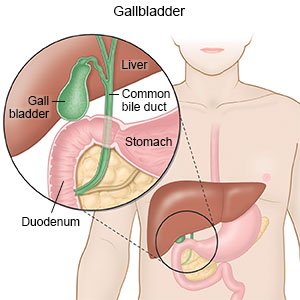ERCP (Endoscopic Retrograde Cholangiopancreatography)
Medically reviewed by Drugs.com. Last updated on Aug 4, 2025.
What do I need to know about endoscopic retrograde cholangiopancreatography (ERCP)?
ERCP is a procedure to examine the ducts of your pancreas or gallbladder. ERCP may also be used to open blocked ducts, or to diagnose problems with your pancreas or gallbladder. An endoscope (thin, flexible tube with a light) will be used for the procedure.
 |
How do I prepare for ERCP?
- Your healthcare provider will talk to you about how to prepare for your procedure. He or she may tell you not to eat or drink anything after midnight on the day of your procedure. Tell your provider about all medicines you currently take. He or she will tell you if you need to stop any medicine before your procedure, and when to stop. He or she will tell you which medicines to take or not take on the day of your procedure.
- Tell your provider about all allergies you have. Tell him or her if you had an allergic reaction to a medicine, contrast liquid, anesthesia, or antibiotics.
- Arrange to have someone drive you home from your procedure.
Related medications
What will happen during ERCP?
- You will be given medicines to help you relax, make you drowsy, and prevent coughing or gagging. Your healthcare provider will insert the endoscope into your mouth. An endoscope is a long tube with a camera and a light. The provider will move the endoscope until it reaches your small intestines. He or she will use the camera to find the opening to the duct.
- He or she will then insert a catheter through the scope and into an opening that leads to your pancreas and gallbladder. He or she will inject contrast liquid and take x-rays to see the ducts better. He or she may insert a tool to remove a blockage or to place a stent to open a plugged duct. He or she may also take a sample of tissue and send it to a lab to be tested.
What should I expect after ERCP?
- You may have a sore throat for a day or two.
- You may have abdominal pain or feel bloated. You may also feel nauseated. These symptoms should go away in a few hours.
What are the risks of ERCP?
You may develop an infection from the scope or tools used during the procedure. The scope or tools may injure your esophagus, stomach, or intestines. ERCP may increase your risk for an abdominal infection or pancreatitis (inflammation of the pancreas). You may also have problems with your lungs or trouble breathing. These problems may become life-threatening.
Care Agreement
You have the right to help plan your care. Learn about your health condition and how it may be treated. Discuss treatment options with your healthcare providers to decide what care you want to receive. You always have the right to refuse treatment. The above information is an educational aid only. It is not intended as medical advice for individual conditions or treatments. Talk to your doctor, nurse or pharmacist before following any medical regimen to see if it is safe and effective for you.© Copyright Merative 2025 Information is for End User's use only and may not be sold, redistributed or otherwise used for commercial purposes.
Further information
Always consult your healthcare provider to ensure the information displayed on this page applies to your personal circumstances.
